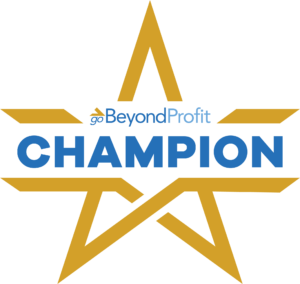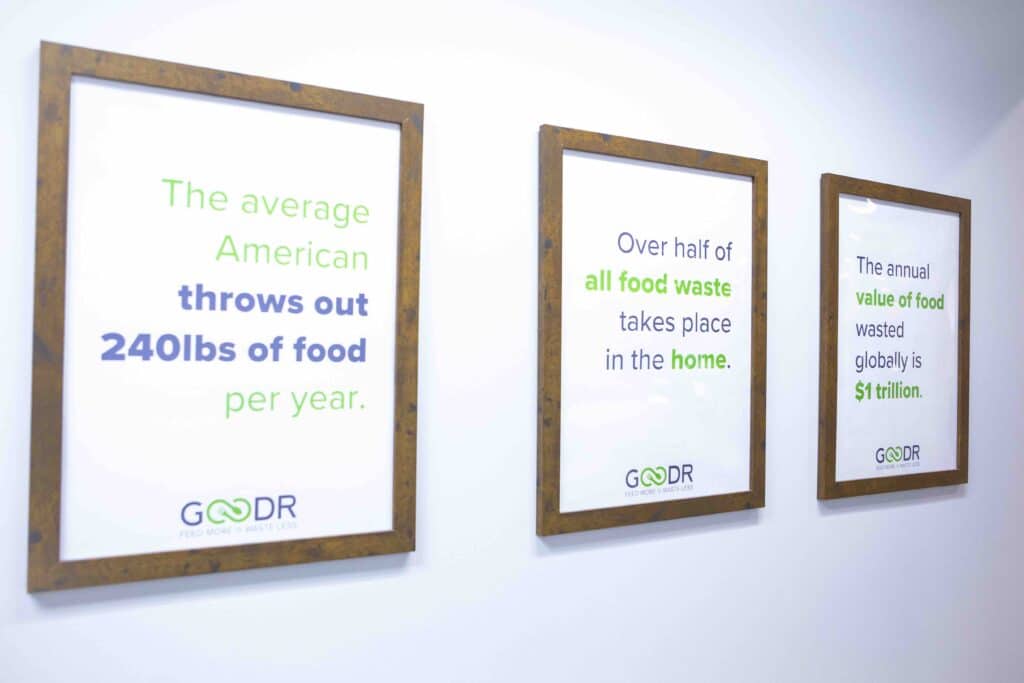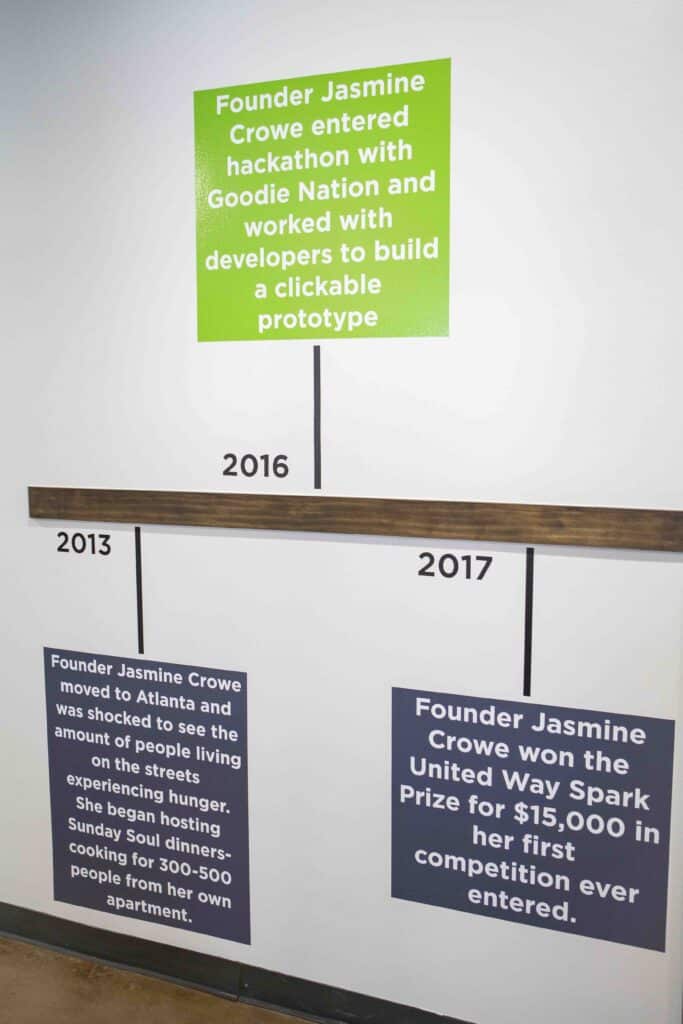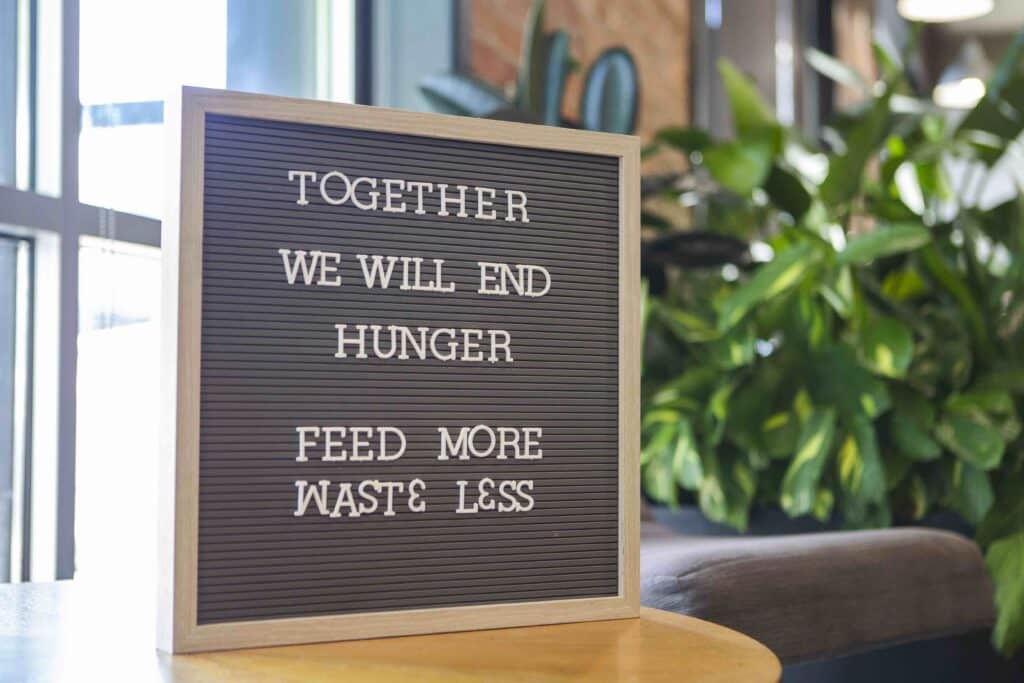The Business of Fighting Hunger
Great company success stories often include a grueling journey that requires relentless determination and artful pivots to achieve a lofty vision. Such is the case with our latest CEO interview with Goodr founder Jasmine Crowe-Houston.
Goodr is the story of an Atlanta founder who has reached the admirable goal of being on Fortune’s global list of the top 50 companies changing the world. Yet, in conversation, Jasmine reminds us of her unyielding focus on harnessing the power of business to achieve a singular, audacious goal of ensuring no one ever goes hungry.
Goodr and their founder and CEO, Jasmine Crowe-Houston were nominated and selected by fellow Georgia business leaders as a goBeyondProfit Champion for developing innovative business solutions that bring countless companies into the fight against hunger and food waste.

From Sunday Soul to For-Profit Solution
When I go back to the beginning of why I started Goodr, it really is rooted in a personal journey of my own. I had been working in the nonprofit space for about seven years, working largely with celebrities as they were starting and running their own nonprofits.
And I was saying to them, the people that are standing in line for Turkey at Thanksgiving are hungry in May as well, that it’s not just a one day a year thing where we need to give and make sure that people have access and that everyone’s going to be able to eat.
One day I went home, and I posted on Facebook that I was starting an initiative called Sunday Soul. It was going to be a pop-up restaurant. We wanted to have tables and chairs and linens and enable people to order off a menu and be treated with dignity as they’re going through this rough patch in their life.
Four years later, a 15-second clip video went viral on Facebook that someone had shared that said — look at what this group did for the homeless community in Atlanta. I woke up the next morning to millions of views and friend requests and thousands of comments. As I was reading through the comments, people kept on saying, this is so amazing, who donated the food? And the truth was no one. I was couponing, price matching, cooking all this food myself. I started to brainstorm how to get food donated and get it to people in need.
A Google search leads me down this deep rabbit hole about food waste. I really was so shocked to learn how much food goes to waste in this country while so many people are going hungry. And I thought, I’m going to solve this. I’m going to create a company to get this perfectly good food to people in need. And that was kind of the early impetus that got us started.
Defining the Problem of Food Insecurity & Waste
The problem of food insecurity and waste is massive. To give you guys a little bit of a scope, we’re wasting about 80 billion pounds of all the food that we produce every single year. And if food waste itself was a country, it would be the third-largest country in the world. There is a lot of perfectly good food that goes to waste.

In the United States alone, the estimate is that we waste about 40% of all the food that we produce. And that’s a problem because in a state like Georgia, one out of nine Georgians go hungry, and those numbers are worse for children and seniors. This is a big problem. We’re wasting perfectly good food, yet we have people who are going hungry.
Solving Hunger with Logistics and Data Analytics
Early on I said that hunger wasn’t an issue of scarcity, but it was a matter of logistics. I read about how much food was going to waste and saw first-hand all the people that were going hungry. What I realized food waste is a logistical solution for businesses that have trash. Companies put food waste in a bin and a waste company picks it up and puts it in a landfill.
I realized that I needed to solve that logistic problem for companies and help them get perfectly good food to people who need food. The early vision was a business that collects excess food, packages it up, labels it, and delivers it right to a nonprofit who can get it to people in need.
Goodr uses data and analytics. It’s really the core of our technology because you can’t manage what you don’t measure. We track the items our customers are wasting on a constant basis. We roll all of this data up in into a report that shows them how much of the food is getting donated, what may be getting recycled, what’s going to landfill, how much they’re saving, how much CO2 emissions they’re literally keeping out of landfill and out of our air and what their sustainable impact is on this community.
The Secret to Start Up Success
Entrepreneurship is very hard. I think a lot of people champion that you go and be an entrepreneur, start your own business, run your own company, live your dreams, don’t go work for someone else and live their dreams. But it is tough and it’s lonely. You have other people’s livelihood in your hands. Your company’s success is responsible for people paying their mortgage, putting their kids through college, feeding their own families. That can be a lot to bear.
I think the secret to kind of staying power is doing something that’s bigger than yourself. And that’s how I keep going. Every single day we are really doing something that matters. We are helping people in their darkest hours, giving them hope, food and an opportunity to be their best selves.
I always think about that old Snickers commercial that said you’re not yourself when you’re hungry. And I think how many people have never been their full selves because they’re hungry all the time. Then I think about the good we do here at Goodr and that’s ultimately what keeps me going. The emails and letters that remind us that someone received the most food they’ve had in their pantry in months. They share with us the new confidence someone has when they don’t have to worry about food for the next week or two. That is what keeps me going.
Implementing a People-First Value
Leading with people first is one of the biggest core values here at Goodr. It’s really my guiding principle. I always go back to what we learned when we were in kindergarten – “Treat others how you would want to be treated”. That’s the simplest rule that often gets forgotten. I just believe that the power of karma is real.
When you put people first and you treat people well, the money will come, the profits will come. And that has always happened for us at Goodr. We’ve put people first, people love us, our customers love us, and they come back, and they continue to do business with us because we operate in that people first mentality. It’s so much more than just profit.
The Pursuit of Dignity Influences Business Strategy
When I talk about treating people with dignity, especially people that are experiencing the problem of hunger, it’s about changing the way we’ve solved hunger in this country for a very long time. I think we all remember doing canned food drives and you’ve maybe volunteered at a food bank or a food pantry, and you put all these items in a box and families come and get them. But we don’t ever shop like that. We go to the grocery store, we fill our baskets with things that we want, things that we know how to cook. But people who are experiencing food insecurity have to take whatever someone gives them and be happy with it because they have nothing else.
For Goodr, we offer dignity in the process by making sure that we provide families with access to foods that enable them to prepare full meals. There’s a big difference in this country between access to food and access to meals. We don’t want someone to get a box of food, get home and realize that there’s nothing they can make. For people who come into contact with Goodr, especially under our Hunger Relief Services, every time they meet us they receive seven to ten days’ worth of food. When we deliver food to our nonprofit partners it’s full meals they can immediately serve their clients. Our services make it easier for nonprofit partners to fulfill their mission. Their food prices and food costs go down so they’re able to reinvest that money that they would’ve spent back into the services that they’re providing for their clients. Dignity is felt across the entire scope of Goodr services.
Necessary Pivots Toward a Vision
When we first started, we were taking the food that was edible and getting that delivered to nonprofits. Soon we realized we were leaving a lot of non-edible food to end up in landfills. So we introduced organics recycling to help our customers turn non-edible food waste into animal feed, compost, and in some cases even energy. That was first iteration and pivot that we had.

A year later, we fell into the global pandemic. And as you can imagine, the businesses that we were recovering food from all went out of business. They closed their doors. But we saw a heightened level of food insecurity in this country.
Little did I know that we would spin up a whole new Hunger Relief Solutions component of our business. Now we work with a lot of different brands, cities and government entities creating sustainable solutions to end hunger in their communities. In fact we just launched a mobile grocery store unit. We plan on taking that all over the state of Georgia with activations set up for Griffin, Georgia, Albany, Georgia, Savannah, Georgia. We are going to be all over the state bringing food access to people that need it the most.
I have a huge vision for where I hope to take Goodr. We’re currently operating in about 35 markets. When we first started, we were just operating in Atlanta. I’d love us to be in every city and every state and we’re working on that. We believe that we need to be everywhere.
Establishing a Foundation of Giving
I started the Goodr Foundation in 2020. What I realized was that a lot of children may get free breakfast and lunch at school, but they’re constantly playing what I would call a catch-up game. The breakfast may only be replacing the dinner that they didn’t get last night or the food that they didn’t have over the weekend. And no teacher can really teach through hunger. With our Neighborhood Eats program, we go right into neighborhoods, right into apartment complexes and provide kids with a hot meal on site and a hot meal to go every Saturday.
We make sure the children have three beverages, three meals and six snacks to get them through the weekend. We’ve held this program now in four different communities since we started and it’s just been world changing to see what we do for these children.

We live to make sure that one day everyone will have access to the food they need. This work could not be done without the people that are committed to ending this massive problem of hunger and food waste that’s plagued us for years. And more than anything, we are committed to finding the solutions. We’re committed to creating a better tomorrow for everybody that comes in touch with us.
